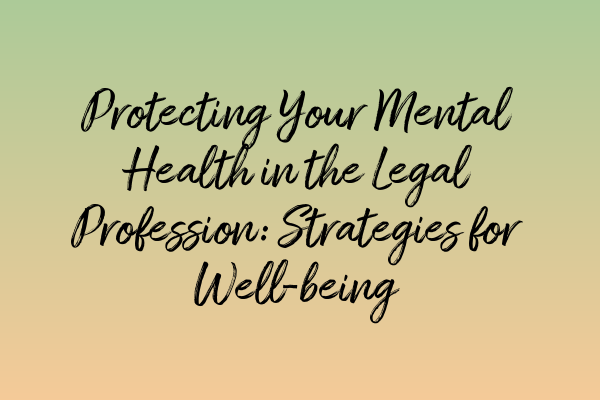Protecting Your Mental Health in the Legal Profession: Strategies for Well-being
Working in the legal profession can be incredibly rewarding, but it can also be incredibly demanding. The pressures of long hours, challenging cases, and intense deadlines can take a toll on your mental health. It is crucial to prioritize your well-being to ensure you can perform at your best both personally and professionally. In this article, we will explore strategies for protecting your mental health in the legal profession.
1. Recognize the signs of stress and burnout
Long hours, high case loads, and intense pressure can lead to chronic stress and burnout. It is essential to recognize the signs and take action to address them. Common signs of stress and burnout include fatigue, irritability, difficulty concentrating, and decreased job satisfaction. If you notice these symptoms, it may be time to reassess your work-life balance and consider seeking support.
2. Prioritize self-care
Self-care is vital for maintaining good mental health. Make sure to establish healthy habits such as regular exercise, healthy eating, and sufficient sleep. Additionally, set aside time for activities that bring you joy and relaxation, such as hobbies, spending time with loved ones, or engaging in mindfulness practices like meditation or yoga.
For more information on protecting vulnerable witnesses in criminal trials, check out our related article: Protecting Vulnerable Witnesses in Criminal Trials: Best Practices and Legal Safeguards.
3. Establish boundaries
The nature of the legal profession often requires long hours and around-the-clock availability. However, it is crucial to establish boundaries to protect your mental health. Set realistic expectations with clients and colleagues regarding response times and availability. Prioritize time for yourself and your loved ones, and don’t be afraid to say no when necessary.
4. Seek support and professional help
Don’t hesitate to seek support when you need it. Reach out to trusted colleagues, friends, or family members who can provide a listening ear or offer guidance. If you find that stress or burnout is affecting your daily life, consider seeking professional help from a therapist or counselor who specializes in working with legal professionals.
5. Practice mindfulness and stress reduction techniques
Mindfulness and stress reduction techniques can help you manage the demands of the legal profession. Consider integrating practices such as deep breathing exercises, meditation, or yoga into your daily routine. These techniques can help calm your mind, reduce anxiety, and improve overall well-being.
For more information on cross-examination techniques, check out our related article: Cross-Examination Techniques: Mastering the Art of Questioning Witnesses.
6. Take regular breaks and vacations
Taking regular breaks and vacations is essential to prevent burnout. Schedule time off, even if it’s just a short break during the day, to recharge and refresh your mind. Plan and enjoy vacations where you can completely disconnect from work. Taking time away from the demands of the legal profession will help you return with renewed energy and focus.
7. Cultivate a supportive work environment
Building a supportive work environment is crucial for protecting your mental health. Foster good relationships with your colleagues, and create spaces for open communication and support. Look out for your colleagues’ well-being as well, as a supportive team can make all the difference in reducing stress and increasing job satisfaction.
For more information on the rights of the accused, check out our related article: Rights of the Accused: Protecting Individual Liberties in Criminal Proceedings.
Conclusion
Protecting your mental health is essential in the legal profession. By recognizing the signs of stress and burnout, prioritizing self-care, establishing boundaries, seeking support, practicing mindfulness and stress reduction techniques, taking regular breaks, and cultivating a supportive work environment, you can create a healthier and more sustainable career in law. Remember, your mental well-being is just as important as your professional success.
For more information on the complexities of UK bail laws, check out our related article: Unraveling the Complexities of UK Bail Laws.


Leave a Reply